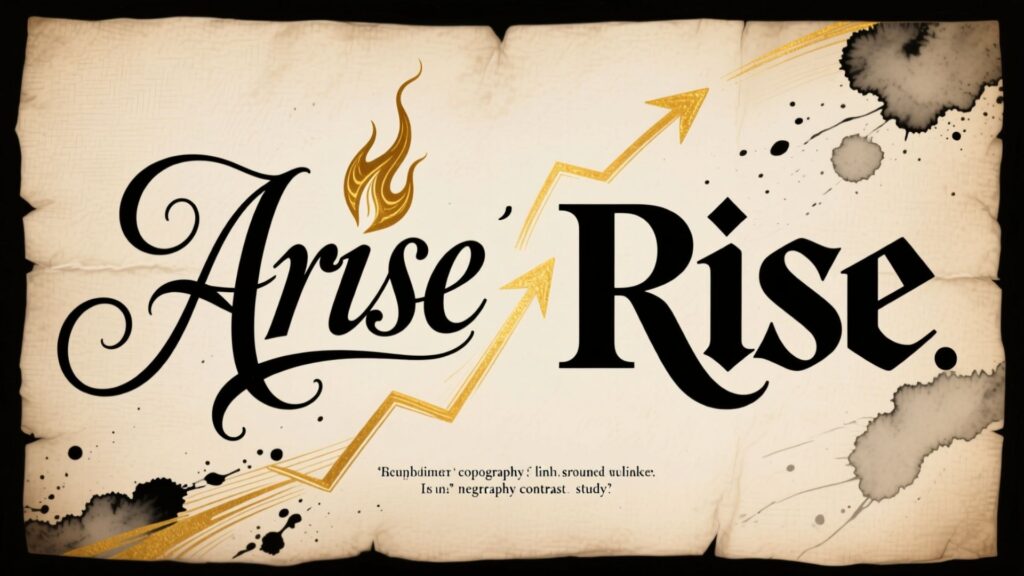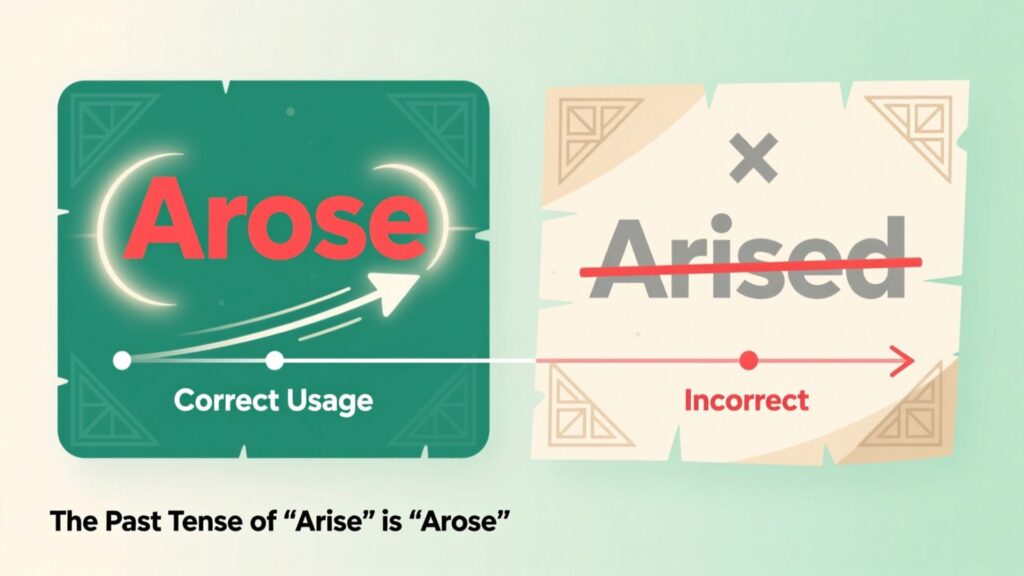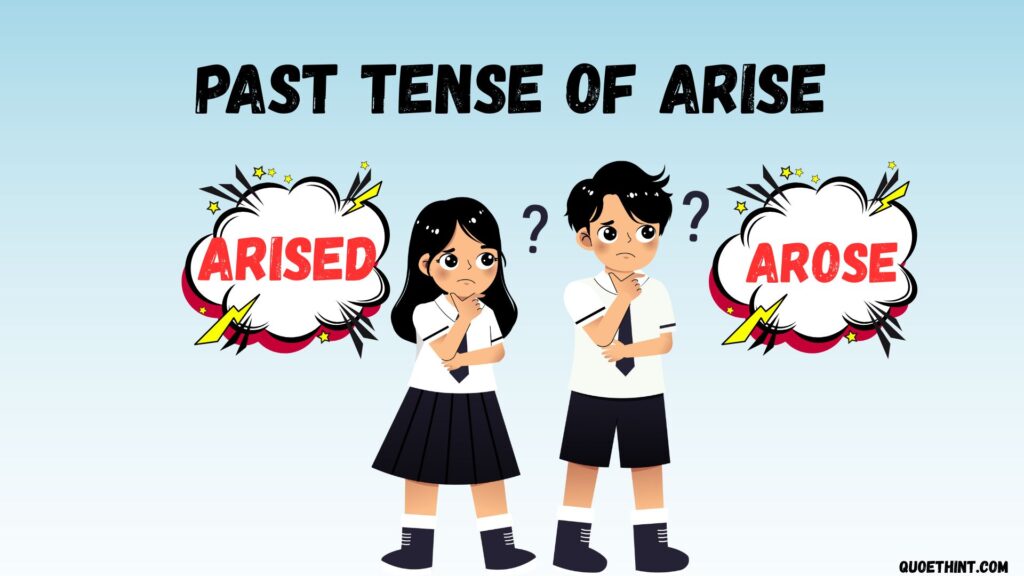Language often throws curveballs, and one of them is deciding between arised or arose. You’ve probably seen both in different places, but only one is correct. This article will clear up the confusion, walk you through grammar rules, and show real-life examples so you never second-guess again.
The Core Question: Arised or Arose?

The correct past tense of arise is arose, not arised.
- Arise is an irregular verb, which means it doesn’t follow the regular pattern of simply adding -ed to form the past tense.
- Instead of arised, you should always write arose.
For example:
- ❌ Problems arised during the meeting.
- ✅ Problems arose during the meeting.
Why “Arised” Feels Tempting
English learners often assume that because many verbs become past tense by adding -ed (like “work → worked” or “play → played”), the same must apply here. That’s not the case.
The word arise belongs to the group of irregular verbs, so it follows its own pattern. Similar examples include:
- seek → sought
- swing → swung
- sing → sang
Just like you wouldn’t say seeked instead of sought, you shouldn’t say arised instead of arose.
Grammar Rules Behind “Arise”
Let’s break down the grammar basics:
- Base form of arise: arise
- Past tense of arise: arose
- Past participle: arisen
- Verb type: intransitive verb (it doesn’t take a direct object)
That means you can’t say “I arose something.” Instead, you use it when something happens or emerges on its own.
Verb Conjugation of “Arise”
Here’s a quick verb tense table for clarity:
| Verb Tense | Example Sentence |
|---|---|
| Base form | Problems arise when communication fails. |
| Past tense | Several issues arose during the project. |
| Past participle | Many conflicts have arisen over time. |
| Present continuous | Questions are arising in the discussion. |
| Past continuous | Opportunities were arising while she worked abroad. |
| Future tense | New challenges will arise with the expansion. |
This chart makes it easy to see why arose is the only acceptable past form of arise.
Practical Examples in Everyday Use
Grammar rules feel more natural when you see them in action. Here are different real-world scenarios using arose correctly.
Example 1: Email to a Manager
Subject: Update on the Client Meeting
Hi Sarah,
During today’s call, several unexpected concerns arose about the pricing structure. I explained our approach, and they seemed reassured. Still, we may need to schedule a follow-up discussion.
Best,
Michael
Example 2: Friendly Conversation
“Yesterday, an opportunity arose to collaborate with a local startup. I think we should explore it.”
Example 3: Formal Report
Several conflicts arose between departments due to overlapping responsibilities. These need to be addressed through clearer role definitions.
Example 4: Customer Service Note
A problem arose with the shipment due to an incorrect address. We’ve already dispatched a replacement package.
Common Contexts Where “Arise” Appears
The verb often describes situations, challenges, or opportunities that emerge naturally. You’ll frequently see these phrases:
- Problems arise when deadlines are ignored.
- Opportunities arise in times of change.
- Questions arise after big announcements.
- Issues arise with poor planning.
When describing these in the past, remember to switch to arose:
- Problems arose when the system went down.
- Conflicts arose between the two teams.
- Opportunities arose after the merger.
- Challenges arose during the training.
Difference Between “Arise” and “Rise”

Another source of confusion is the link between arise and rise. Both come from similar Old English roots, but they differ in meaning.
- Rise means to move upward or increase.
- Example: The sun rose at 6:00 AM.
- Arise means to emerge, occur, or develop.
- Example: Several questions arose after the announcement.
Think of it this way:
- Rise = physical movement upward.
- Arise = situations or opportunities emerging.
Historical Roots of “Arise”
The verb arise goes back to Old English “arīsan”, which combined the prefix a- (meaning “out” or “away”) with rīsan (“to rise”). It spread through Germanic languages and evolved into its Middle English form before settling into today’s usage.
This history explains why it doesn’t follow regular verb endings (-ed). It’s part of the long list of irregular verb patterns that English inherited.
Synonyms for “Arise” and “Arose”
To keep your writing fresh, you can replace arise or arose with synonyms depending on the tone.
- Synonyms for arise: emerge, occur, appear, develop, surface, originate, manifest.
- Synonyms for arose: emerged, occurred, appeared, developed, surfaced, originated, manifested.
For example:
- Instead of “A problem arose,” you could write “A problem occurred.”
- Instead of “An opportunity arose,” you might say “An opportunity emerged.”
Tips to Avoid the “Arised” Mistake

- Memorize irregular verbs – Keep a list handy with examples like seek → sought and arise → arose.
- Practice with examples – Write short sentences or even mock emails.
- Use a verb conjugation chart – A visual reminder helps you recall quickly.
- Listen to native speakers – Notice how they use “arose” naturally in conversations.
- Check your writing aloud – If “arised” sounds odd, that’s because it is.
Final Thoughts
When it comes to arised or arose, there’s no debate: the correct past tense of arise is arose. The word belongs to the family of irregular verbs, so it doesn’t take the predictable -ed ending.
Whether you’re writing a professional email, a detailed report, or a casual conversation, using arose will make your writing polished and accurate. Remember, clarity in language builds confidence, and knowing the difference ensures your communication always stands tall.
Bugti is the founder of Quoethint.com, a hub for English language tips, writing advice, and grammar guidance. With years of experience in English studies and a passion for clear communication, Bugti created this platform to make grammar and writing easy to understand for everyone.
